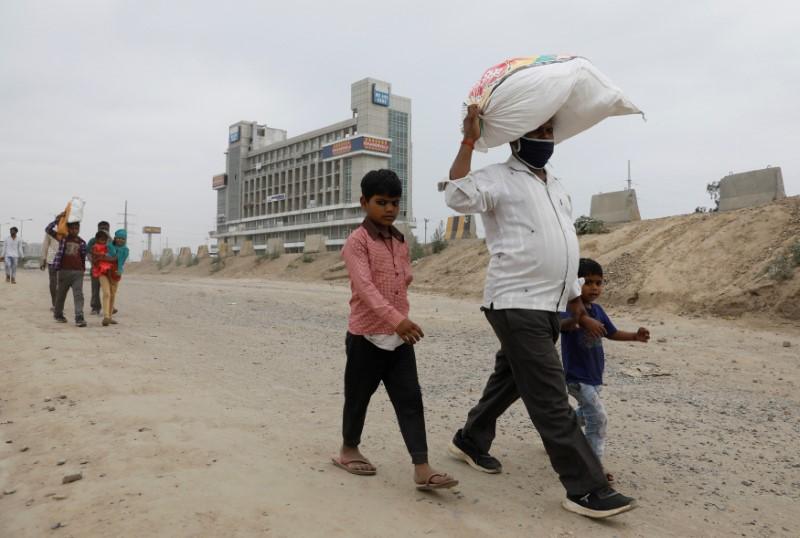Migrant Workers Face Long Walk Home Amid Covid-19 Lockdown
Mar 27, 2020 | Pratirodh Bureau
Migrant workers and their families walk on a highway as they look out for a transport to return to their villages, in Ghaziabad, on the outskirts of New Delhi on March 26, 2020
After India imposed a 21-day nationwide lockdown on Tuesday to prevent the spread of coronavirus, the plywood factory near Uttar Pradesh’s state capital Lucknow where Surendra Pandey works was forced to shut down.
On Thursday morning, with no way of earning a living, the 28-year-old labourer set off on a 110-kilometre (68-mile) walk back to his home village.
“I tried catching a bus or truck yesterday, but there is no transport available on the road, so I decided to walk,” he told Reuters, some 30 km (19 miles) into his journey.
“There is no food available on the roads but thankfully a few citizens offer us food, biscuits and water. It’s better to be home than to be here in the city without food and water.”
Officials say the shutdown of all but essential services is necessary to beat coronavirus in the densely populated country of 1.3 billion people, with health infrastructure that can ill-afford a widespread outbreak. India has so far reported more than 600 confirmed cases of coronavirus and 13 deaths.
India’s government announced on Thursday a $22.6 billion economic stimulus plan that provides direct cash transfers and food security.
But for India’s estimated 120 million migrant labourers, the shutdown is a crisis, as wages dry up and many cannot afford the rent or even food in the cities.
Across India, more than a dozen labourers Reuters spoke to returning home said they had been left with little choice other than to attempt to walk back to their home villages after work – and public transport – vanished.
“HOUR OF CRISIS”
Mamata Banerjee, chief minister of West Bengal, wrote on Thursday to the heads of other Indian states, saying that manual workers were facing “an hour of crisis”.
Vinod Hathila, 39, a manual worker in Surat, in Gujarat, left for his home town on Wednesday, walking for hours along railway tracks with his 15-year-old son until he found a bus.
With no work, he said he doesn’t know how he will support his family during the lockdown.
“I’ll probably borrow some money on interest from someone,” he said.
Ashok Punjabi, who heads a construction workers’ union in Gujarat, said 60,000-70,000 people working as domestic helps and in other unorganized sectors in Ahmedabad, had headed to homes in neighbouring Rajasthan after the 21-day lockdown was announced, many on foot and carrying their possessions.
“To see young children and women being forced to walk hundreds of kilometres like this is just sad,” said Punjabi, who is also a senior opposition party member in the state.
Kuldeep Arya, a senior official in the Gujarati state capital of Gandhinagar, said 4,000 people had been provided with food and water while trying to return home.
There were similar scenes in India’s capital New Delhi, where hundreds of migrants walked down deserted highways to neighbouring Uttar Pradesh this week.
“For two days the ration guys were not giving us any food, we were hungry for two days. So we decided, ‘let us go to our parents’,” said Raju, a 24-year old migrant worker walking from Noida, a satellite town of Delhi, to Agra, nearly 200 km away.
“Since there’s no transport available, we decided to walk all the way.”
